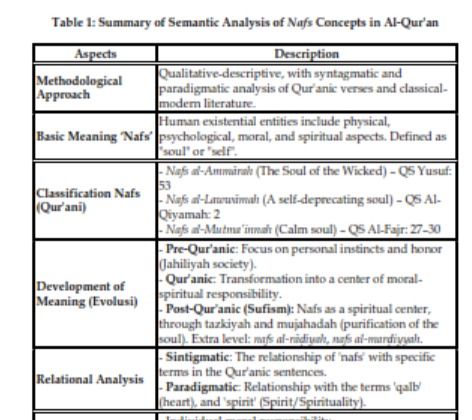Semantic Analysis of Nafs in the Qur’an: A Toshihiko Izutsu Perspective and Its Relevance in Modern Thought
DOI:
https://doi.org/10.69526/bir.v1i3.360Keywords:
Nafs, Qur'an, Purification of the Nafs, Tazkiyah, Morality, TasawwufAbstract
This research aims to explore the concept of ‘nafs’ in the Qur'an, both historically and theologically, and understand its relevance in modern life. The research uses a descriptive-analytical qualitative approach, with syntagmatic and paradigmatic analyses of relevant Qur'anic verses, as well as classical and contemporary literature studies. The results show that ‘nafs’ covers the physical, moral, and spiritual dimensions of human beings, with the main classifications: nafs al-ammārah (a soul inclined to evil), nafs al-lawwāmah (a self-deprecating soul), and nafs al-mutma'innah (a serene soul). The transformation of the meaning of ‘nafs’ from the pre-Qur'anic to the post-Qur'anic period reflects the human journey towards purification of the soul (tazkiyah) which contributes to the formation of individual character and social harmony. In the modern context, the understanding of ‘nafs’ has significant relevance in education, Islamic psychology and individual moral development. The research concludes that the purification of the soul is central to the Qur'anic worldview, making the ‘nafs’ the centre of moral and spiritual responsibility, which has a direct impact on the justice and balance of society.
References
P. Burlian, “Konsep Al-Nafs Dalam Kajian Tasawuf Al-Ghazᾱlī,” J. Theol., vol. 24, no. 2, pp. 223–246, 2013. https://doi.org/10.21580/teo.2013.24.2.334
A. Sachedina, Islamic biomedical ethics: Principles and application. Oxford University Press, 2009. https://doi.org/10.1093/acprof:oso/9780195378504.001.0001
M. A. Sherif and A.-C. Ngonga Ngomo, “Semantic Quran,” Semant. Web, vol. 6, no. 4, pp. 339–345, 2015, doi: https://doi.org/10.3233/SW-140137.
S. Sviri, “The self and its transformation in Sufism,” Self Self-Transformation Hist. Relig. eds. David Shulman Guy G. Stroumsa, pp. 195–215, 2002. Sviri, Sara, ‘The Self and Its Transformation in Sufism: With Special Reference to Early Literature’ inDavid D. Shulman and Guy G. Stroumsa (eds.), Self and Self-Transformation in the History of Religions(Oxford: Oxford University Press, 2002), pp. 195–21
M. B. A. Bahy and M. A. Taufiq, “Implications of Islamic Education Perspective of Ibnu Khaldun in Elementary Schools,” Al-Mudarris J. Educ., vol. 6, no. 2, pp. 110–121, 2023. https://doi.org/10.32478/al-mudarris.v6i2.1636
S. Afrashteh, “Dhikr in Islamic Sufism. A Case Study: the Order of Kubrawiyya,” Tasavvuf Araştırmaları Enstitüsü Derg., vol. 3, no. 1. https://dergipark.org.tr/tr/pub/taed/issue/84899/1455266
A. J. Wensinck, The Concept of Nafs in the Qur’an. 1954.
S. A. Chishti, “Re-thinking Jihād: A Semantic Analysis of the Qur’anic Vocabulary,” AlBayan, vol. 13, no. 1, pp. 1–24, 2015, doi: https://doi.org/10.1163/22321969-12340015.
I. El-Zeiny, “The Semantics and Ethics of Sa‘ādah (Happiness) in the Qur’ān,” Islam. Stud., vol. 59, no. 1, pp. 95–113, 2020. https://doi.org/10.52541/isiri.v59i1.1172
E. Yulianti, B. Zulyeno, and M. N. Naser, “Sociolinguistics as a Method to Interpret the Physical Existence of Heaven and Hell in the Qur’an,” in Online Conference of Education Research International (OCERI 2023), Atlantis Press, 2023, pp. 240–252. https://doi.org/10.2991/978-2-38476-108-1_23
A. Rothman and A. Coyle, “Toward a framework for Islamic psychology and psychotherapy: An Islamic model of the soul,” J. Relig. Health, vol. 57, pp. 1731–1744, 2018. https://doi.org/10.1007/s10943-018-0651-x
S. N. Zulkipli, I. Suliaman, M. S. Zainal Abidin, N. Anas, and A. Che Ahmat, “The Development Theory of al-‘Aql, al-Qalb and al-Nafs in Islamic Psychotherapy,” Int. J. Acad. Res. Bus. Soc. Sci., vol. 12, no. 11, pp. 2432–2449, 2022. Doi: http://dx.doi.org/10.6007/IJARBSS/v12-i11/15013
F. E. Ramadhani and K. Khotimah, “Memahami Kecerdasan Emosional dan Spiritual Melalui Lensa Islam,” MERDEKA J. Ilm. Multidisiplin, vol. 1, no. 2, pp. 1–17, 2023. https://doi.org/10.62017/merdeka.v1i2.196
J. E. B. Lumbard, “The Semantics of Gratitude (Shukr) in the Quran,” J. Islam. Ethics, vol. 5, no. 1–2, pp. 173–193, 2021, doi: https://doi.org/10.1163/24685542-12340073.
H. F. Ahmed, “The alchemy of happiness by Abu Hamid Al-Ghazali, translated by Claud Field,” Karachi, Pakistan, 2019. https://doi.org/10.4324/9781315700410
Ḥusain Naṣr, Islamic spirituality: foundations. Crossroad, 1987.
Y. Suzuki and M. D. Miah, “Lender’s position in the profit and loss sharing Islamic finance: an analytical perspective of Izutsu’s hypotheses on ‘Islam’ and ‘Hilm,’” Int. J. Islam. Middle East. Financ. Manag., vol. 16, no. 4, pp. 687–700, 2023, doi: https://doi.org/10.1108/IMEFM-12-2021-0496.
J. Koláček, “The qurʼān as a source for contemporary islamic environmental ethics*,” Arch. Orient., vol. 88, no. 2, pp. 221–248, 2020, [Online]. Available: https://www.scopus.com/inward/record.uri?eid=2-s2.0-85101885071&partnerID=40&md5=aaa4608177bfeeefab6de0da9415d477
E. Al-Akoub, “Izutsu’s study of the Qur’an from an Arab perspective,” J. Qur’anic Stud., vol. 14, no. 1, pp. 107–130, 2012, doi: https://doi.org/10.3366/jqs.2012.0039.
A. Khalil, “Remembering Toshihiko Izutsu: Linguist, Islamicist, Philosopher,” in Islamic History and Civilization, vol. 202, Brill Academic Publishers, 2023, pp. 528–550. doi: https://doi.org/10.1163/9789004529038_027.
I. Albayrak, “The reception of Toshihiko Izutsu’s Qur’anic studies in the Muslim world: With special reference to Turkish Qur’anic scholarship,” J. Qur’anic Stud., vol. 14, no. 1, pp. 73–106, 2012, doi: https://doi.org/10.3366/jqs.2012.0038.
A. Mudakir, D. Darmawan, and W. Taufiq, “The Meaning of Hawa in the Qur’an: A Semantic Analysis of the Perspective Toshihiko Izutsu,” J. Iman Dan Spiritualitas, vol. 2, no. 2, pp. 155–166, 2022.
E. Al-Akoub, “Izutsu’s Study of the Qur’an from an Arab Perspective,” J. Qur’anic Stud., vol. 14, no. 1, pp. 107–130, 2012. Doi: https://doi.org/10.3366/jqs.2012.0039
D. D. Erwahyudin, M. Muzakki, and A. M. Latief, “The Concept of Nafs in Islamic Psychology and its Relevance to Student Development,” Al Misykat J. Islam. Psychol., vol. 1, no. 2, pp. 84–96, 2024. https://doi.org/10.24269/almisykat.v1i2.7758
M. Badrun et al., “THE SIGNIFICANCE OF THE QURANIC LANGUAGE AS A FUNDAMENTAL CONCEPT OF SEMANTICS: AN ANALYSIS OF TOSHIHIKO IZUTSU’S THOUGHT,” Quranica, vol. 15, no. 1, pp. 1–21, 2023, [Online]. Available: https://www.scopus.com/inward/record.uri?eid=2-s2.0-85218712196&partnerID=40&md5=6acb1bb809d4cba79a4a5e2ec2cae0c7
S. Al-Din Al-Zaral, “Applied semantics and the Qur’an: Izutsu’s methodology as a case study,” J. Qur’anic Stud., vol. 14, no. 1, pp. 173–200, 2012, doi: https://doi.org/10.3366/jqs.2012.0047.

Downloads
Published
Issue
Section
License
Copyright (c) 2023 Zaduna Fiddarain, Farrel Izham Prayitno, Sulhi Kholid Al Abid (Author)

This work is licensed under a Creative Commons Attribution 4.0 International License.



















